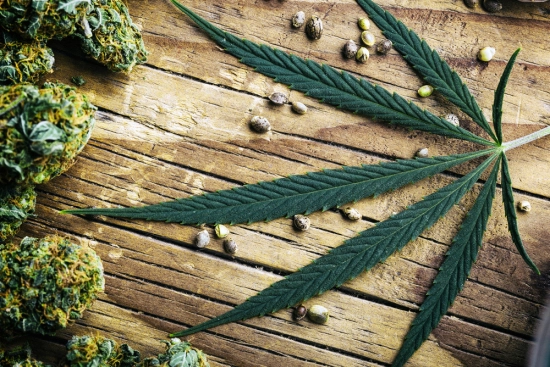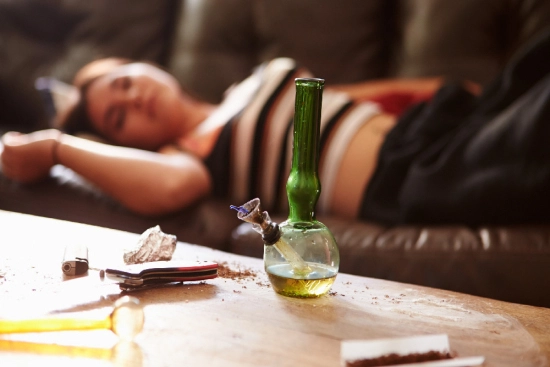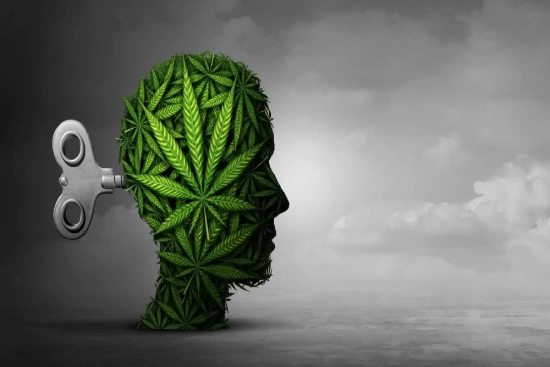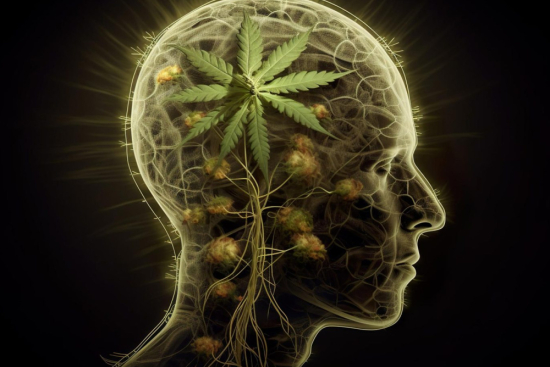Cannabis use is increasing rapidly, particularly among young people, raising serious concerns regarding the risks of addiction. This dependence can profoundly impact physical and mental health, as well as damaging social and professional relationships. In response to this disturbing trend, there is a growing demand for effective cannabis addiction treatment worldwide. Our partner clinics in Turkey are dedicated to addressing this crisis, offering comprehensive detoxification and rehabilitation programs tailored to help individuals reclaim their lives.
Best Clinics with Verified Reviews

What is cannabis dependence?
Cannabis, or marijuana, is a plant whose active ingredients, cannabinoids, act on the central nervous system. It is the most widely used illicit psychoactive substance in the world, particularly among young people between the ages of 15 and 30, who are particularly vulnerable to addiction.
THC, the main psychoactive component of cannabis, acts on the brain by binding to specific receptors. The result is altered sensory perception, mood, and cognition. These effects can be both immediate and long-lasting, affecting brain development and cognitive performance.
Although increasingly accepted, cannabis can be addictive, profoundly changing the lives of those who use it regularly. The euphoric effects, seductive at first, can quickly turn into compulsive cravings that are difficult to control.
If you or someone you know is affected, don't hesitate to consult a medical professional in Turkey for help and appropriate solutions.

Mechanism of action of marijuana
Cannabis, an ancient plant with many facets, is attracting increasing interest. But how does it work on a biological level? By understanding the mechanisms of action of cannabis, we can better understand its many effects, both recreational and therapeutic.
Cannabis exerts its effects by interacting with our endocannabinoid system, a network of receptors present throughout the body. Two types of receptors are particularly important: CB1 receptors, which are concentrated in the brain, and CB2 receptors, which are more abundant in the immune system.
CB1 and CB2 receptors, present throughout the body, are like locks. Cannabis molecules like THC and CBD are like keys that fit into these locks.
- THC (tetrahydrocannabinol): This molecule binds primarily to CB1 receptors, which are located primarily in the brain. It is responsible for the psychoactive effects of cannabis, such as euphoria, relaxation and altered perception.
- CBD (cannabidiol): CBD interacts with various biological systems and has numerous therapeutic properties, including anxiolytic, anti-inflammatory, and anticonvulsant. Unlike THC, it does not produce a "high".

Effects of cannabis use
Cannabis is a complex substance with multiple and varied effects.
Short-term effects
The main psychoactive compound in cannabis, THC, binds preferentially to CB1 receptors. This interaction triggers a cascade of effects, including:
- Feelings of euphoria and relaxation: THC stimulates the release of dopamine, a pleasure neurotransmitter, which enhances reward circuits.
- Altered perception: THC can alter the perception of time, space, and sensation, leading to feelings of euphoria, anxiety, or confusion in some people.
- Physiological effects: Cannabis can cause an accelerated heart rate, dilated pupils, and dry mouth.
Long-term effects
Long-term use of cannabis may have adverse effects, including:
- Memory and concentration problems: Regular, long-term use can impair cognitive function.
- Mental health problems: Cannabis can worsen symptoms of schizophrenia and increase the risk of anxiety disorders in some people.
- Respiratory problems: Smoking cannabis irritates the airways and may increase the risk of lung disease.

Therapeutic uses of cannabis
The therapeutic properties of cannabis are increasingly being studied and recognized. Cannabis and its derivatives can be used to:
- Relieve chronic pain: Cannabis can reduce the perception of pain and improve the quality of life of patients suffering from chronic diseases.
- Combat nausea and vomiting: It stimulates appetite and reduces nausea, especially in cancer patients undergoing chemotherapy.
- Improving symptoms of certain neurological disorders: Cannabis can reduce muscle spasms in people with multiple sclerosis, for example.
Risk factors
The effects of cannabis vary greatly from person to person and depend on many factors, such as:
- Plant composition: The THC/CBD ratio and the presence of other cannabinoids and terpenes influence the effects experienced.
- Method of consumption: Smoking, vaporizing, or ingesting cannabis produces different effects in terms of intensity and duration.
- Context of use: The social environment, emotional state, and expectations of the individual also play a role.
Signs of marijuana addiction
Cannabis dependence can sneak up on you and have serious consequences for your daily life. Recognizing the warning signs is important so you can act in time.
Here are some warning signs that should not be ignored:
- Priority given to use: Cannabis becomes the focus of attention to the detriment of other activities, responsibilities, or relationships.
- Loss of control: Difficulty reducing or stopping use, despite willingness to do so.
- Cognitive impairment: Memory and concentration problems, difficulty making decisions.
- Emotional problems: Irritability, anxiety, depression, frequent mood swings.
- Deterioration of social relationships: isolation, conflicts with friends and family, neglect of responsibilities.
- Tolerance and withdrawal syndrome: Need to increase doses to get the same effect (tolerance) and occurrence of unpleasant symptoms when stopping (withdrawal).
- Self-neglect: Decreased personal hygiene, decreased interest in activities once enjoyed, decreased performance at school or work.
Marijuana withdrawal: Symptoms and effects
When individuals stop using marijuana, they may experience a variety of withdrawal symptoms. These symptoms can vary in severity and duration depending on the individual's use patterns and physiological makeup. Common cannabinoid withdrawal symptoms include:
- Irritability and mood swings.
- Insomnia and sleep disturbances.
- Loss of appetite and weight loss.
- Cravings for cannabis.
- Headaches and difficulty concentrating.
- Indigestion and nausea.
Cannabis withdrawal can have a significant impact on a person's overall well-being. Physical and emotional symptoms can disrupt daily routines and make it difficult to focus on work, relationships, and personal goals. The effects can vary from person to person, ranging from mild discomfort to more intense episodes of anxiety or depression.
Different approaches to cannabis treatment in Turkey
Our partner clinics in Turkey offer various treatment options for cannabis addiction. These include:
Cognitive behavioral therapy (CBT)
Individual Cognitive Behavioral Therapy (CBT) provides a safe and confidential space to explore the thoughts, feelings, and underlying factors that contribute to cannabis addiction. This approach focuses on changing thought patterns and behaviors associated with marijuana use.
Learning new skills to manage stress, resist cravings, and avoid triggers can help people with addiction stay sober.
Medical detox programs
Detoxification programs in Turkey are often recommended for people with severe cannabis addiction. These programs provide medical guidance and constant supervision to help ease the withdrawal process. Participants may receive medication and psychological support to manage withdrawal symptoms and reduce the risk of relapse.
Residential rehabilitation
In some cases, residential rehab may be recommended to treat cannabis addiction in Turkey.
These programs provide a residential environment where participants can focus entirely on their recovery. They benefit from 24-hour supervision, medical care, and a full range of individual and group therapies.
Alternative therapies
In addition to traditional treatments, some people in Turkey may choose to explore alternative therapies to treat cannabis addiction. These therapies may include acupuncture, art therapy, meditation, and yoga. Although scientific evidence on the effectiveness of these alternative therapies is limited, some people may find it beneficial to supplement their traditional treatment with these approaches.

Finding support and hope
Cannabis addiction can seem overwhelming, but it's essential to understand that recovery is possible with the right support and resources. Here are some important steps to finding support and hope:
- Recognize the problem: Admitting that cannabis addiction is a problem is the first step toward recovery.
- Seek professional treatment: Consult a qualified healthcare professional in Turkey for personalized assessment and treatment recommendations.
- Join a support group: Participating in support groups can be a valuable source of support, understanding, and encouragement.
- Cultivate healthy activities: Find new activities that give you pleasure and help you maintain a balanced, sober life.
- Surround yourself with support: Build a strong support network by surrounding yourself with positive, caring people.
Share this page






